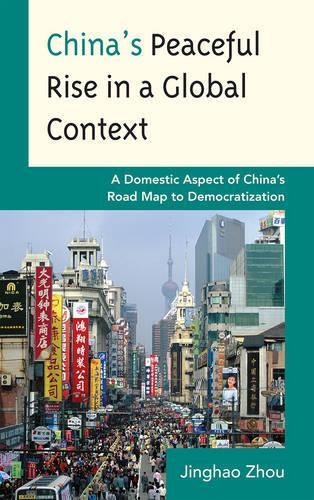
China's Peaceful Rise in a Global Context: A Domestic Aspect of China's Road Map to Democratization
(Paperback)
Publishing Details
China's Peaceful Rise in a Global Context: A Domestic Aspect of China's Road Map to Democratization
By (Author) Jinghao Zhou
Bloomsbury Publishing PLC
Lexington Books
8th March 2012
United States
Classifications
Professional and Scholarly
Non Fiction
Far-left political ideologies and movements
Political structures / systems: democracy
320.951
Physical Properties
Paperback
236
Width 155mm, Height 229mm, Spine 15mm
363g
Description
China's rise has become inevitable, but there is no agreement about whether China will rise peacefully or pose a threat to the United States. The author asserts that both theories of "China threat" and "peaceful rise" failed to address China's central domestic problem. Thus, both theories are not convincing. This book attempts to develop a third view of China's rise from a domestic perspective and contends that China's potential threat to the existing global order is not derived from her rapid economic growth and military expansion, but from her potential domestic chaos. A strong democratic China will contribute to the global peace, but the collapse of China will gravely threaten Western societies.
The current Chinese political system directly contributes to this social instability and could possibly cause China's social crash. China's democratization is the key to ensure China's peaceful rise in a global context. However, the Party is still in power and any attempt to dissolve the one-party system in present day China has poor prospects. China must take a two-step, gradual reform approach to complete the transition from an authoritarian regime to a democratic one. In the two-step theory, the first phase for promoting China's democratization includes exercising freedom of media, increasing the consciousness of citizen participation, and enacting religious rights. Through all these democratic exercises, China will gradually be able to achieve a fully democratic society. This two-step theory is crucial for the United States if it is to enact effective foreign policy toward China and for China to develop a democratic harmonious society.
Reviews
Zhou (Hobart and William Smith) does not claim to be the first to advance it, but his premise concerning China's peaceful rise is both credible and significant. China's rise under the reformist Communist Party leadership in the post-Mao era has been unprecedented. Western fears notwithstanding, China's development does not (presently) threaten the global order. However, market forces and an authoritarian, one-party system have fostered severe domestic strains (e.g., inequalities, political corruption, and prostitution) that threaten domestic stability. Social chaos in China would jeopardize the global system. Democratization is the answer, but it must proceed in a two-step sequence: first, the development and fruition of civil societynotably press freedom, citizen participation, and religious freedomand second, the transition from a one-party to a multiparty system....The book was thoroughly researched and written by one who knows China well. Full of information about contemporary China, it might be a worthwhile addition to university collections on Chinese political economy. Recommended. * Choice Reviews *
China's Peaceful Rise is a superb analysis of China's present social and political status. It explores the emerging prospects for further democratization, and the obstacles to real progress toward democracy: massive social problems, imbedded corruption, limitations on personal freedoms, rampant prostitution, and most significantly, the Communist Party's tight grip on power and dissent. As one who knows China inside and out, Zhou has crafted a book that gets beyond popular speculation to hard evidence about whether a mature democracy might take root in China. -- Derek H. Davis, dean, College of Humanities, University of Mary Hardin-Baylor
Author Bio
Jinghao Zhou is associate professor in the Department of Asian Languages and Cultures at Hobart and William Smith Colleges, New York.
